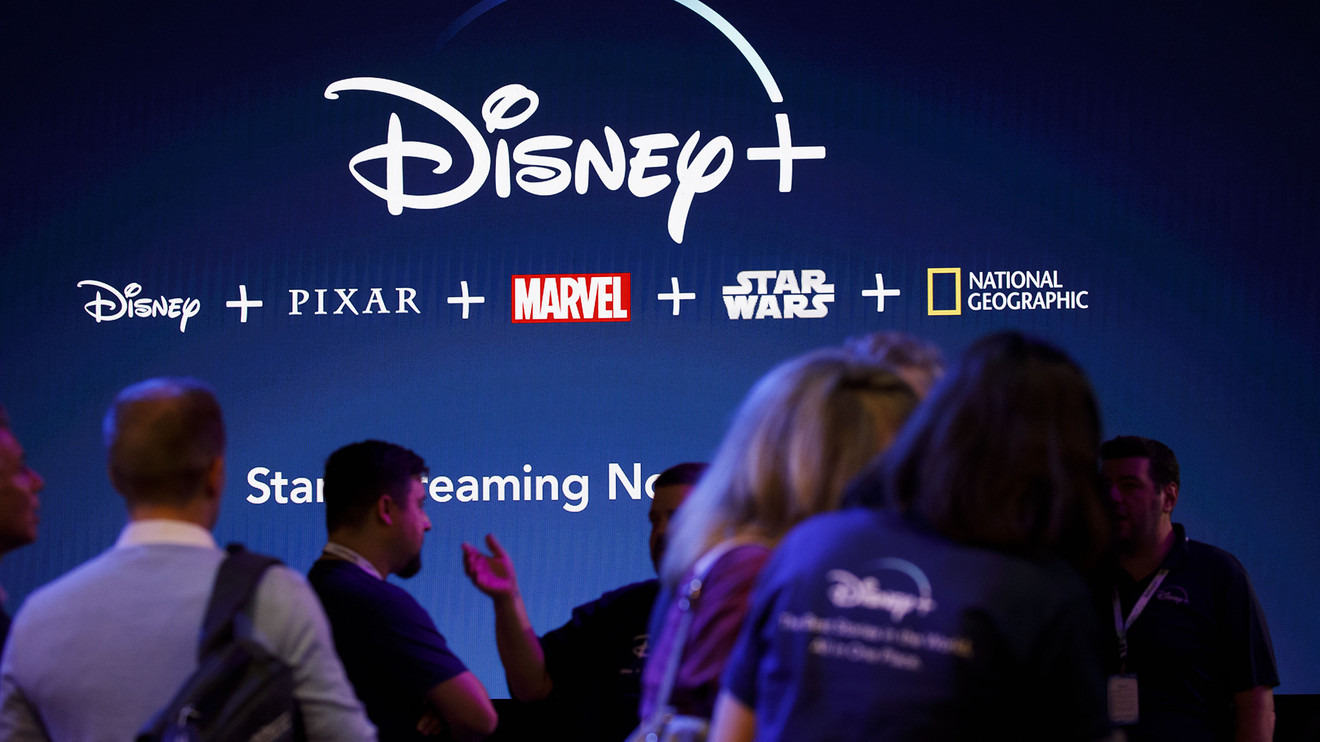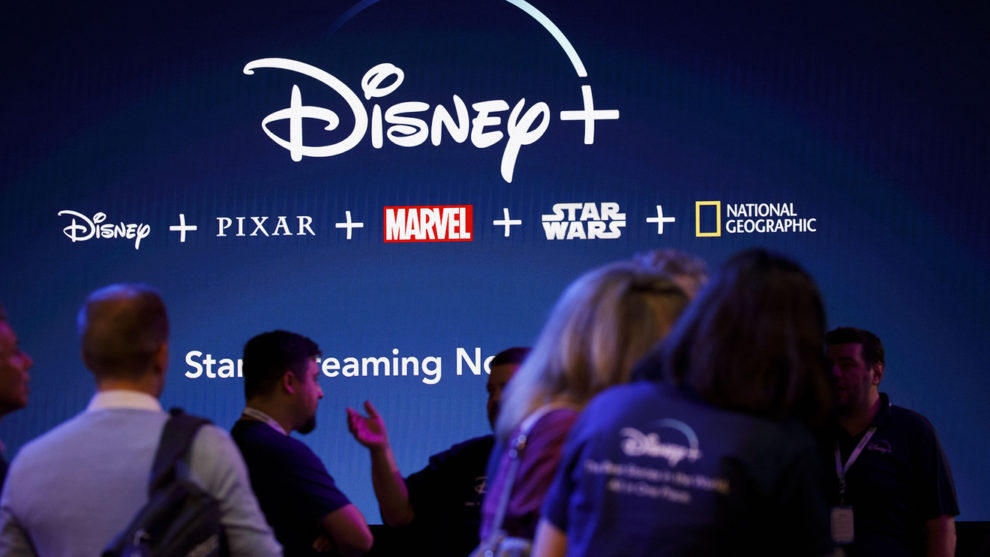
The sharks are circling Netflix Inc., and they smell blood in the water.
Blood as in hemorrhaging users and a stock in freefall. Its salvation, ironically, may be a gangster epic that looks like a heavy Oscar favorite.
The start of the traditional fall TV season in late September has been teeming with ads for new streaming services from Apple Inc. AAPL, +1.21% and Walt Disney Co. DIS, +0.96%, both of which debut in November. Comcast Corp.’s CMCSA, +0.45% NBCUniversal service and AT&T Inc.’s T, +0.80% HBO Max are due in spring 2020.
The onslaught of content could be as overwhelming for consumers as the cutthroat competition is among the combatants.
Keeping track of what program plays on what service is tough enough. Adding to the acrimony, Disney is banning Netflix ads across its TV networks, according to a report in The Wall Street Journal. (Disney, Comcast and AT&T are expected to spend hundreds of millions of dollars on advertising over the next year to promote their new streaming-video services. Netflix spent $1.8 billion on advertising last year.) Disney Chief Executive Robert Iger resigned from Apple’s board in September on the same day Apple announced pricing for its streaming service.
Read more: Disney CEO Bob Iger resigns from Apple’s board
It all makes for must-see streaming-TV as Netflix NFLX, +0.96% kicks off the earnings season among the principal combatants this week.
What we might learn about each of the major players during earnings season:
Netflix (see sidebar; earnings reported Oct. 16)
AT&T Inc. (Oct. 23)
AT&T’s as-yet-unpriced HBO Max, due in spring 2020, is the new streaming home of “Friends” and an exhaustive list of original shows and movies from the likes of Reese Witherspoon, Joss Whedon, Jordan Peele, Stephen King, and producer Greg Berlanti (“Dawson’s Creek,” “Riverdale”). It also owns the exclusive rights to “Sesame Street.”
Top-quality, yes. But how does it coexist with HBO Now, and does it water down the HBO brand?
Many of the people who made HBO a powerhouse have departed, though HBO Max has poached executives from Nickelodeon and Disney to oversee family programming, the CEO of Otter Media to handle digital.
Amazon.com Inc. (Oct. 24)
Amazon Prime Video, which starts at $12.99 a month, has been Netflix’s main rival until nearly every major content provider made the plunge into streaming. It’s got plenty of content — Thursday Night Football, “The Marvelous Mrs. Maisel,” and the new anthology series “Modern Love” starring Tina Fey and Anne Hathaway — if you can find it.
This is one of the criticisms of Amazon, thought it remains the No. 2 streaming service after Netflix.
Amazon Prime Video will close out 2019 as the second-largest subscription OTT service provider with 96.5 million viewers, up 9% from 2018, according to eMarketer. By 2021, Amazon Prime Video’s audience is expected to equal a third of the U.S. population, eMarketer said.
In comparison, Netflix is expected to reach 158.8 million viewers by the end of 2019, eMarketer said.
Comcast Corp. (Oct. 24)
Comcast NBCUniversal’s Peacock will be the new streaming home of “The Office” and “Parks and Recreation” when it premieres in April 2020. It has yet to announce pricing.
“We looked and said, ‘Let’s do something different than in a very increasingly crowded field’ and ‘what is our fastest way to get to profitability and do so with the least amount of investment?,’” Comcast CEO Brian Roberts said at the Goldman Sachs Communacopia Conference in New York City in August. He described Peacock as an ad-supported, direct-to-consumer service.
Beyond that, what it has to offer is anyone’s guess. Comcast has admitted its “vast majority” of content is initially likely to be acquired. The platform is also likely to host content from Sky Studios, which Comcast purchased last year as part of its $39 billion acquisition of Sky.
The premise of Peacock as a place to see beloved reruns is intriguing, if not exactly a financial driver. Nonetheless, NBCUniversal plans to promote Peacock hard during its coverage of the 2020 Summer Olympics.
“I don’t believe [Peacock is] going to materially affect Comcast and our ability to grow,” Roberts said in August. “We can make this investment, it can be significant, but not in a way that will retard NBC from the growth we’ve been able to enjoy.”
Apple Inc. (Oct. 30)
Apple TV+ is depending on a former “Friend” and a touch of Spielberg-ian magic when it debuts Nov. 1. It’s also offering the service free for one year with the purchase of any new Apple device.
The $4.99-per-month service is getting plenty of run with a TV advertising blitz and the marketing efforts of Apple, which has positioned it as the linchpin of its burgeoning Services division. That’s especially important for Apple investors, who are keeping a keen eye on Services, whose revenue growth has compensated for a drop in iPhone sales.
Read more: The iPhone just did something it hasn’t done in nearly 7 years, and it isn’t good for Apple
Beyond the veneer of “The Morning Show” starring Jennifer Aniston, Reese Witherspoon and Steve Carell, Apple is leaning on Old Hollywood stalwarts Steven Spielberg (“Amazing Stories” reboot) and Oprah Winfrey. The company will reportedly release three films — “The Banker,” “Hala,” and “The Elephant Queen” — in theaters before they appear on Apple TV+.
As with most Apple products, patience is required. The company’s initial content looks thin, and it might require an acquisition or two to build it out. Then again, Apple has previsously entered established markets late, built a formidable audience through its proprietary platform, and then helped redefine the market.
Roku Inc. (Nov. 6)
Roku ROKU, -0.36% shares have soared 244% this year this year on strong earnings, but its shares have retreated 38% since the Sept. 6 record close of $169.86, on fears of competition.
Oppenheimer Research analyst Jason Helfstein rejects the premise that Roku is vulnerable. In a note late last month, he gave the stock an Outperform rating and boosted its price target by $35 to $155. FactSet’s average analyst estimate is $131.
Helfstein based his bullish view on international growth opportunities — they made up 10% of Roku’s sales in the first half of this year — and Roku’s ability to resell streaming content from Apple, Disney, and others. Potential competing products from Facebook Inc. FB, +0.01% and others, he wrote, are “too late.”
“I believe that the technology we’ve developed, the skills we have, our strategy, applies directly to international,” Roku CEO Anthony Wood said on a conference call in August, though he declined to detail the company’s expansion plans. “We think we will be successful there.”
Walt Disney Co. (Nov. 7)
The $6.99-per-month Disney+ debuts in North America Nov. 12 with arguably the deepest library of content. Disney classics. Star Wars. The Marvel Universe. Pixar. “The Simpsons.” National Geographic. Under a three-year agreement, the service costs $3 a month. A bundled package with ESPN and Hulu costs $12.99 a month.
On the surface, Disney seems to have it all: World-famous content. Far-reaching digital platforms. A traditional TV network to produce and market programs. A younger audience that drives home purchases. In a tweet, the company promised more than 7,500 episodes and 500 movies in its first year.
A not-so-secret weapon is its ability to be the exclusive streaming home to theatrical blockbusters from Marvel, Pixar, Star Wars, and the Disney studio. “Avengers: Endgame” will be available to stream Dec. 11. What is more, Disney+’s original programming feeds off its big-budget franchises. Original Marvel shows, for example, will be closely wedded to storylines that play out on the big screen in theaters. The upcoming live-action, big-budget series “The Mandalorian” is a Star Wars spinoff.
Disney’s Iger has proclaimed Disney+ as the future of the company, and Morgan Stanley analyst Benjamin Swinburne projects the company could have more than 130 million subscribers across its online video services worldwide by 2024. In a June note, Swinburne said he expects Disney to sign 13 million subscribers by the end of 2020, which would give it 50 million total subscribers across Disney+, Hulu, and ESPN+.
“While there is no true ‘Netflix killer’ on the market, Disney’s upcoming bundle with Disney+, Hulu, and ESPN+ probably comes closest,” says Eric Haggstrom, forecasting analyst at eMarketer.
Netflix’s stock has slumped 22% over the past 12 months, while shares of Disney have rallied 14%, and of Amazon’s has lost 8.1% and the Dow Jones Industrial Average DJIA, +0.27% has tacked on 0.5%.











Add Comment